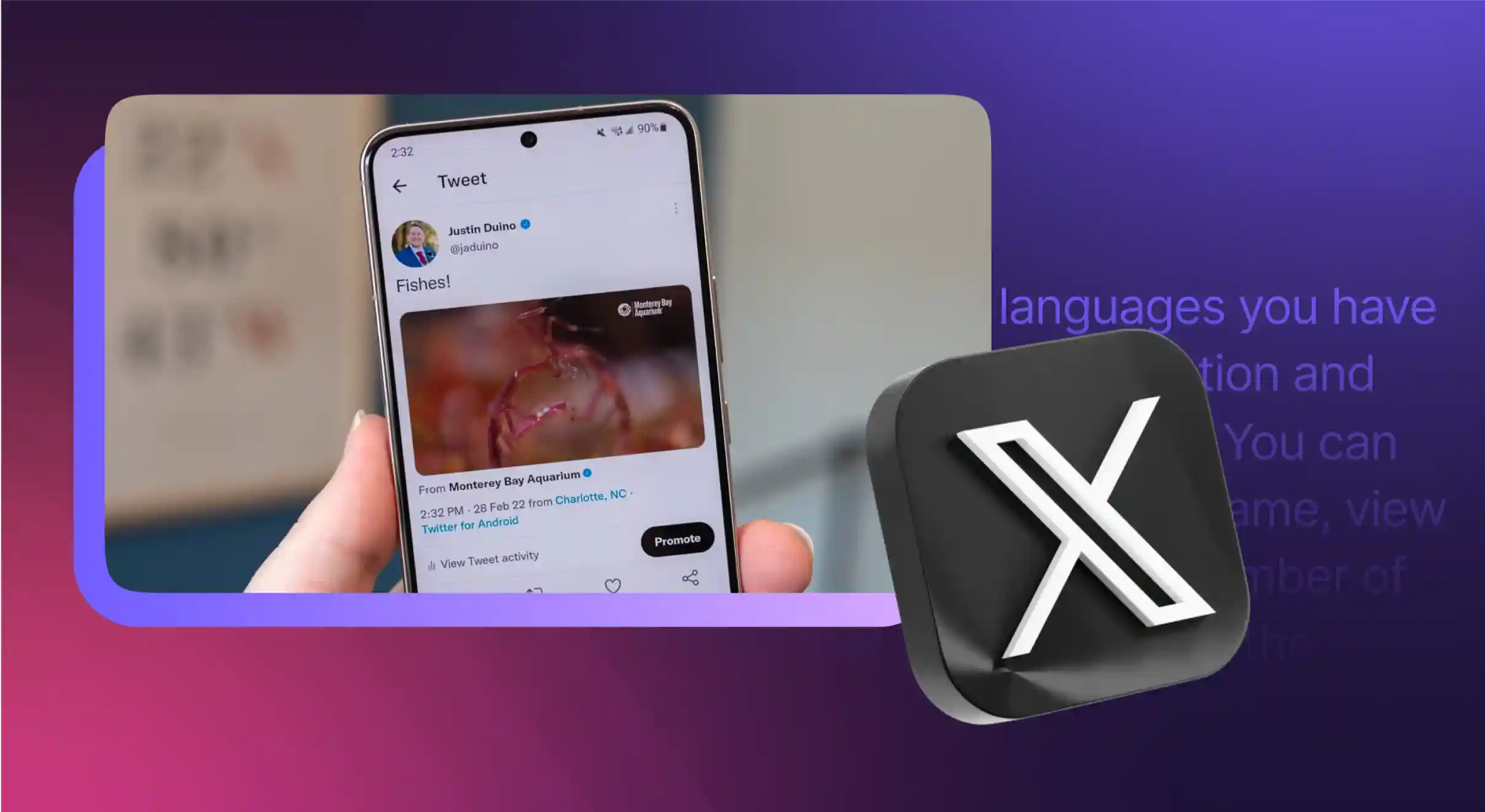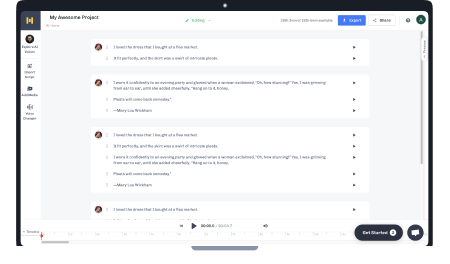Twitter Video Translator: How to Translate Twitter Videos in Minutes

Key Takeaways
- Twitter’s global user base makes video translation essential for overcoming language barriers and maximizing engagement.
- The platform supports translation of tweets and captions but lacks native tools for translating video audio.
- Translator bots and closed captions offer partial workarounds but may lack contextual accuracy.
- AI tools provide a more reliable method for translating Twitter videos with synchronized subtitles and multilingual voiceovers.
- Murf AI enables automated dubbing, subtitle editing, and export in multiple formats for easy sharing.
- Translating videos expands reach, improves accessibility, and strengthens brand credibility.
- Best practices include preserving tone, adapting cultural context, and validating translations with native feedback.
- High-quality translation ensures videos resonate naturally with global audiences.
Twitter has completely changed how we communicate, share, and connect with audiences globally. Now rebranded as X under Elon Musk's leadership, it has become a powerful tool for individuals, brands, and organizations to share ideas, updates, and stories. With its 600 million+ active user base and emphasis on video content, X has evolved into a go-to platform for creators.
However, the diversity of Twitter's user base means that language differences often become communication barriers. Translating videos on Twitter has emerged as an essential strategy to overcome these barriers.
Since Elon Musk’s acquisition, Twitter has seen a significant rise in user activity, increasing the demand for engaging and accessible content. This has also fueled the popularity of video translations, especially since the Creator Revenue Sharing Program rewards creators whose content garners high engagement. Subtitles and translations are no longer optional—they are critical tools for ensuring that videos reach their maximum potential audience.
Despite its global reach, Twitter currently lacks native video translation tools. Fortunately, numerous third-party solutions and methods can bridge this gap.
Why Translate Twitter Videos?
Translating videos is a strategic approach to maximizing your content's impact. Here are the key reasons to translate your Twitter videos:
Expand Your Audience Reach
With millions of users worldwide, Twitter is a truly global platform. Translating your videos allows you to connect with audiences beyond your native language. For example, a video shared in English may attract viewers in the U.S. and U.K., but translating it into Spanish, Hindi, or Arabic can exponentially increase its reach across continents.
Enhance Accessibility
Translations make your videos accessible to people who speak different languages and to individuals with hearing impairments. Providing subtitles or translated captions ensures no audience segment is left out, reinforcing your commitment to inclusivity.
Strengthen Brand Identity
For brands, translating videos demonstrates cultural awareness and a global perspective. It shows that your brand values inclusivity and is committed to building connections across linguistic divides, enhancing its credibility and reach.
Twitter's Current Translation Capabilities
While tweets and captions can be translated into different languages, the platform currently lacks a Twitter video translation solution. It creates a challenge for users who want to understand or share multilingual Twitter video content directly on the platform. However, there are workarounds, including closed captions and the use of translator bots, that help bridge the gap.
Translating Tweets and Captions
Twitter offers a simple and convenient feature to translate tweets and captions into a user’s preferred language. This functionality ensures users can access written content from across the globe without relying on external tools.
Here’s how you can enable tweet translations:
Step 1: Enable Tweet Translations
Open the Twitter app or website and navigate to the Settings and Privacy option.
.webp)
Under Accessibility, Display, and Languages, select Languages.
.webp)
Update the display language and additional languages options to enable translations for text content in your timeline.
.webp)
Step 2: Translate a Tweet
Find a tweet in a foreign language. Click the “Translate post” button located beneath the tweet.
.webp)
The translated text will appear instantly in your selected language.
.webp)
While this feature is helpful for text, it does not extend to video content. Users seeking to translate video dialogues must explore alternative solutions like translator bots or third-party tools.
How to Translate Twitter Videos with Translator Bots
Twitter users can rely on bots that are automated accounts designed to assist users by translating Twitter videos upon request. They offer a quick and accessible solution but may lack the contextual accuracy of professional tools.
How Translator Bots Work
Translator bots process video content by extracting audio, running it through speech-to-text algorithms, and translating the text into the desired language. The results of these video translator bots are delivered as subtitles or as a separate text reply.
Steps to Use Translator Bots on Twitter
Step 1: Find and Follow a Bot
Search on Twitter for popular translator free AI video translator bots like @TranslateMom, and @vidtranslator. Follow these Twitter translator bots to activate its services.
.webp)
Step 2: Tag the Bot in a Reply
When you encounter a video you want to translate, navigate to the Reply section and tag the Twitter translator bots (e.g., @TranslateMom).
Step 3: Receive the Translation
The bot will process the video and provide a response with translated subtitles or a link to view the translation.
Using Closed Captions as a Supplement
For videos with enabled closed captions, here’s how you can turn them on:
- Find the Video: Locate the tweet containing the video.
- Play the Video: Tap the video thumbnail to open the video player.
- Enable Captions: Tap the three dots at the top-right corner of the video player to access the menu. If available, select the option to enable captions.
Note: While translator bots are convenient, their translations may occasionally lack precision due to algorithmic limitations. Consider Professional tools like Murf that will transcribe audio seamlessly, which helps generate captions that can then be translated into multiple languages.
Step-by-Step Guide to Translating Twitter Videos Using AI Tools
AI tools, especially a reliable voice translator, offer the most effective way to translate Twitter videos into your target language. These AI video and audio platforms support multiple video formats and are designed for seamless video translation. They provide features like subtitle synchronization, multi-language support, and contextual accuracy.
1. Choose an AI Tool for Video Translation
Murf AI stands out for its comprehensive features and ease of use among the many AI tools available.
Key Features of Murf AI:
- Accurate Translations: Maintains the integrity of the original content while translating.
- Multiple voice options and languages: Murf offers a wide range of voices in over 20 languages.
- Customizable Options: Users can edit translations to align with cultural or contextual nuances.
2. Uploading and Translating Video Content
Step 1: Upload the Video to Murf Dub
Log in to your Murf Dub account. Name your Project and upload the video file from your device.
.webp)
Step 2: Generate Translations
Select the option between 'Automated Dubbing' and 'Quality Assurance'. As Automated Dubbing is more suitable for beginners and Quality Assurance is only available in the Enterprise plan, you can click Automated Dubbing and hit Next.
.webp)
Select the source language and choose the target language for translation. A free account offers 200 credits to start with, which is enough for 100 minutes of video translations.
.webp)
Review the details and click Start Dubbing if everything is in order.
.webp)
Edit the translated subtitles to ensure accuracy and relevance.
.webp)
Step 3: Export the Translated Video
After finalizing the subtitles, embed them into the video or download them separately. Export the video in the desired format (MP4, MKV, AVI, or MOV) and resolution for sharing on Twitter.
.webp)
3. Sharing Translated Content on Twitter
Once your video is translated, follow these steps to post it effectively on Twitter:
1. Upload the Translated Video: Open the X app or website.
.webp)
Click the top window that reads 'What is happening?' and upload the translated video.
2. Write a Captivating Caption:
Add a caption that complements the video and includes relevant keywords. Use hashtags to improve discoverability and engagement.
3. Tag Relevant Users:
Tag collaborators, influencers, or relevant accounts to amplify your video’s reach. The same process applies across platforms, so creators can also explore YouTube video translation to maximize reach and consistency in multilingual content.
Best Practices for Translating Twitter Videos
Translating videos with an AI video translator is not just about language conversion, it involves ensuring that the message, tone, and context resonate with the target audience. Here are some best practices to consider for video translations for tweets:
Maintaining Contextual Accuracy
A well-translated video should maintain the tone and intent of the original content. An informative video should retain its professional tone, while a humorous one should preserve its playful essence. Avoiding literal translations is key, which can lead to confusion or misinterpretation. For example, the English phrase “It's raining cats and dogs" would not make sense in French if directly translated as "Il pleut des chats et des chiens." Instead, the culturally appropriate equivalent "Il pleut à verse," meaning "It's pouring heavily," effectively conveys the intended meaning. It’s also important to understand the difference between translation vs transcription. While transcription captures spoken words as text, translation adapts that text into another language while keeping context intact.
Ensuring Cultural Relevance
Cultural references, humor, and idioms often do not carry the same meaning across different languages, so translations should be localized to fit the audience's expectations. A joke that resonates in one culture may not have the same effect elsewhere, and certain phrases or gestures may carry unintended connotations. Conducting audience research is crucial in this regard, as understanding linguistic and cultural nuances helps create translations that feel natural and relatable rather than forced or out of place.
Quality Assurance in Translations
A poorly translated video can confuse audiences or even alienate them if the wording feels unnatural. Seeking feedback from native speakers or cultural experts can provide valuable insights, helping refine the translation before publishing. Additionally, testing engagement with a smaller audience before releasing the final version allows for adjustments based on real user feedback.

Frequently Asked Questions
Are There Free Tools Available for Translating Twitter Videos?
.svg)
Yes, translator bots on Twitter provide essential translation services. However, premium platforms like Murf AI offer superior quality and advanced features.
Can Translating Videos Help Increase Engagement?
.svg)
Absolutely. Translated videos reach a broader audience, leading to higher likes, shares, and comments. They are more likely to go viral, mainly if they cater to culturally diverse audiences.
Does Twitter Have an Auto-Translate Feature for Videos?
.svg)
No, Twitter does not currently support auto-translation for videos. External tools and services are required to add translations or subtitles.




![Here's How to Translate TikTok Videos in Minutes [in English!]](https://cdn.prod.website-files.com/675151245f2993547dbd5046/697b408b2d612cc6f3d31a38_67b448f0b2d1a657a0d02d2e_Hero%252080.webp)

.webp)
.webp)






